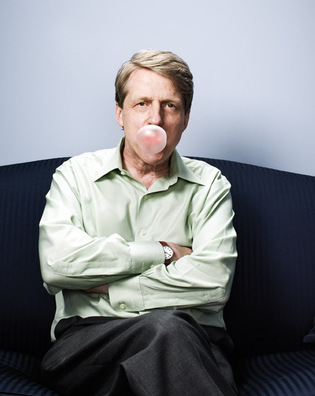 loading
loading
featuresThey called him “Mr. Bubble.”In 2000 he said the dot-coms would go bust. Internet entrepreneurs scoffed. In 2005, he said the housing boom would cause a recession. Mortgage lenders laughed. Wouldn't you like to know what Mr. Bubble has to say today? David Leonhardt ’94 is an economics columnist for the New York Times.  Peter YangView full imageSometime in the mid-1980s, Robert Shiller and John Campbell ’84PhD created The Chart. It wasn't especially complicated. It showed average stock prices, relative to corporate earnings, going all the way back to the late nineteenth century. Wall Street analysts produce charts along these lines all the time. The measure is called the price-earnings ratio, and it is the single most common analytical yardstick of the stock market. The yardstick that Shiller and Campbell created, however, came with a twist -- a twist that transformed their little chart into The Chart. Today, The Chart stands as one of the signature pieces of economic research of the past generation. It is rigorous enough to have appeared in the Journal of Portfolio Management and simple enough to be understood by those of us who are behind on our Portfolio Management reading. Anyone who heeded the central lesson of Shiller and Campbell's analysis -- as well as the lesson of a subsequent chart, created by Shiller, on the housing market -- could have avoided some of the worst pain of the financial crisis. If Alan Greenspan had taken The Chart seriously during the late 1990s, Greenspan's reputation might be in better shape today. So might the United States economy. Nouriel Roubini, the doomsday-prophesizing finance professor at New York University who has lately become a media darling, credits The Chart for much of his clairvoyance. The Chart and its co-creator happen to have much in common. At first glance, they both seem simple enough. It is just a series of numbers, depicted on a piece of paper. He, as his old teacher, the Nobel Laureate and textbook author Paul Samuelson, has said, is “a long-jawed, serious fellow” -- “like a hayseed boy off a farm with a straw in his mouth.” The Arthur M. Okun Professor of Economics, who has taught at Yale since 1982, Shiller has a hesitant, almost shy, manner. But don't be fooled by that.
|
|